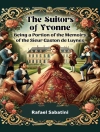In ‘The Last of the Foresters, ‘ John Esten Cooke weaves a compelling narrative set against the backdrop of the American Civil War, blending rich historical detail with vivid characterizations. The novel follows the life of an outspoken Confederate soldier, exploring themes of loyalty, sacrifice, and the moral complexities of war. Cooke’s literary style combines romanticism with realism, crafting lyrical prose that captures the tumult and fervor of the era, while also offering a poignant reflection on the trials faced by those caught in the conflict. The work stands as a testament to the cultural narratives of the South and adds a unique voice to the growing body of Civil War literature in the 19th century. John Esten Cooke, an acclaimed Southern writer and soldier, drew from his own experiences during the Civil War to inform his storytelling. Having witnessed the strife and valor of his peers, Cooke’s deep-rooted Southern identity infused his narratives with authenticity and emotional depth, allowing readers a glimpse into the lives of those who lived through this turbulent period. His contributions to literature serve not only as a record of history but also as an exploration of the human spirit. ‘The Last of the Foresters’ is essential reading for those interested in Civil War narratives, Southern literature, and the intersection of history and fiction. Cooke’s masterful storytelling and deep insights will resonate with readers, providing both a gripping tale and an exploration of the complexities individuals face in times of great moral conflict.
Про автора
John Esten Cooke was an American novelist and a veteran of the Civil War, whose literary efforts sought to capture the essence of Southern life, particularly in Virginia during and after the war. Born on November 3, 1830, in Winchester, Virginia, Cooke hailed from a prominent family, which gave him access to the social and historical milieu that would permeate his writing. He is most noted for his contribution to antebellum literature, with his prolific output including historical romances and tales that often romanticized the chivalric ideals of the Old South. Among his celebrated works, ‘The Last of the Foresters’ (1856) vividly portrays the cultural landscape of rural Virginia and stands as a compelling reflection of the times. Cooke’s literary style is characterized by a blend of detailed descriptive narrative and a romanticized historical approach, which together paint a vivid picture of the period in which he lived. His works, though perhaps shadowed by the later realities of the Civil War, offer a window into the antebellum South, capturing the imaginations of readers in his time and beyond. Cooke’s death on September 27, 1886, marked the end of an era for Southern literature, but the depth and historical value of his work continue to be appreciated by scholars and readers interested in the literary and cultural history of the United States.












